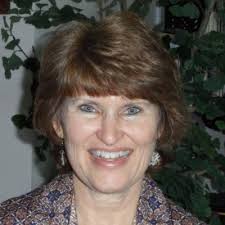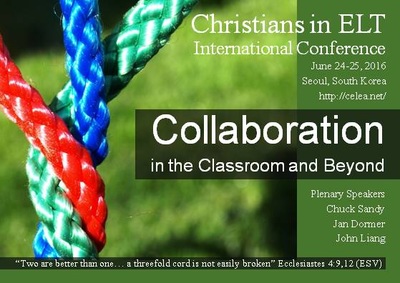I have had the pleasure of meeting Jan Dormer once at an international CELT (Christian English Language Teaching) conference. What a warm, wonderful and fun person who demonstrated the love of Christ. When the Christian Teachers' Special Interest Group (CT-SIG) started making plans to host the next CELT, asking her to speak was one of the easiest decisions we made. She will be a plenary speaker for CELT 2016.
I asked her for the following interview at the beginning of November. She blessed me personally with her answers and I'm sure she will bless you as well.The following interview will give you a preview of a faithful woman holding true to her call to teach English and train teachers. I am honored that she is joining us for CELT 2016!
How did you get connected with English language teaching?
I grew up as the daughter of missionaries in Brazil, and began tutoring Brazilians in English when I was just a teenager. It was natural, then, for me to pursue an M.A. in TESOL right after completing my undergraduate degree in Elementary Education. I married a Canadian pastor, and began my TESOL career teaching adult immigrants in Ontario. After 8 years in Canada we became missionaries, and I taught ESOL in just about every imaginable context during our years in Indonesia, Brazil and Kenya. One thing I love about TESOL is the variety it offers. I have enjoyed teaching to all age groups, at all language levels, in all different types of schools and programs.
Tell our readers about your teaching context. Where do you teach and how long have you been there? What kind of courses do you teach?
I am an Associate Professor of TESOL at Messiah College, where I mostly teach in our graduate level TESOL programs. I have been at Messiah College for four years – ever since we returned from serving overseas. Our graduate program at Messiah College includes four main TESOL courses, which comprise our Graduate TESOL Certificate. Students can then go on to complete our full M.Ed. in TESOL. I mostly teach the topics of Second Language Acquisition, TESOL in Ministry, TESOL Methods, and thesis supervision. I do teach a course focusing on Global TESOL and TESOL Ministry at the undergraduate level as well. I am passionate about helping all of my students discover how they can serve God and others through TESOL!
One of the goals of the Christian Teachers Special Interest group (CT-SIG) is to explore the ways our faith connects to our teaching contexts. Can you comment on this? What are some of the ways you connect your faith to your teaching?
My faith saturates my teaching! God has called me to be salt and light for Him, just as he has called all of us, no matter what our professions. TESOL is the vocation He has given me in which to do this. At the same time, He has given me a passion for TESOL, and the exuberance and joy that I have when teaching ESOL or TESOL comes from Him.
On a more concrete level, I have identified four “M’s” that can characterize ESOL teaching as Christian: Methods, Modeling, Materials and Mentoring. How these aspects play out will vary from context to context. In the Christian English school that I developed in Brazil, our program was transparently Christian, and we saw a lot of spiritual growth in our students and staff. When I taught English for three years in a Muslim elementary school in Indonesia, these principles played out very differently. To learn more about these 4 M’s of Christian ESOL and what they might look like in different contexts, come to my plenary at CELT Seoul!
Tell our readers about your book Teaching English in Missions: Effectiveness and Integrity.
During my years on the mission field I discovered that though there were many people engaged in English ministry, few had training in TESOL. At the same time, criticism against “Teaching English as a Missionary Language” (e.g. Pennycook & Coutand-Marin, 2003) began to emerge from the professional TESOL community. As someone with a foot in both the missionary and the professional TESOL world, I felt God nudging me to explore what characterized teaching English in missions well. I focused in on the need for effectiveness – to have the training needed to truly teach English well, and integrity – to be honest and transparent in our claims and actions.
My book first provides cautions against the use of TESOL ministry without appropriate preparation and understanding, outlining four possible “harms”. It then goes on to explore four distinct types of TESOL ministry, drawn from differing goals and contexts: host evangelism, host discipleship, ambassador evangelism and ambassador discipleship. Finally, my book seeks to show what are the hallmarks of effectiveness and integrity in TESOL Ministry – in what I hope is a reader-friendly tone with lots of anecdotes from real ministry experiences!
The theme for CELT 2016 is collaboration. How do you address collaboration in your teaching context? What collaborative projects are you currently working on?
I love this theme, and I am hard pressed to think of any part of my career that has not been marked by collaboration. My doctoral research focused on NEST-NNEST (Native English Speaking Teacher and Nonnative English Speaking Teacher) collaboration and relationships at Christian schools in Indonesia and Brazil. That research resulted in a template that schools can use to ensure positive and mutually edifying relationships, which I call “shared competence”, between NESTs and NNESTs on a school staff (see Dormer, 2012).
Currently, I am part of a team developing an ESL program at our church. Our area has many Somali refugees, who are Muslim. As these individuals have begun coming into our church for ESL classes, we have had many hurdles! However, collaboration, with our shared goal of Christian ministry, is taking us through the bumps in the road. It is exciting to see what God is doing, and none of it would be possible without the work of many people, each carrying out their part contributing to the whole.
What aspects of collaboration do you find particularly challenging?
Working closely with others usually requires compromise, and that is sometimes hard! If our new church-based ESL program is really going to be a team effort, for example, that means that what I think is “best” may not always prevail. Others need opportunities to use their ideas, and to learn from experience. What I try to keep front and center in my thinking is that this is God’s program, not mine. He is fully capable of carrying out His plan despite our human missteps and imperfections. That perspective helps me to extend grace and support instead of insisting on my own ideas.
References
Dormer, J. E. (2012). Shared competence: NEST/NNEST collaboration that benefits all in Honigsfeld and M. Dove (Eds.), Co-teaching and Other Collaborative Practices in the EFL/ESL Classroom: Rationale, Research, Reflections, and Recommendations, Charlotte (pp. 241-250.) NC: Information Age Publishing.
Pennycook, A (with Sophie Coutand-Marin). (2003). Teaching English as a missionary language (TEML). Discourse: Studies in the Cultural Politics of Education. 24/3, 337-353.



 RSS Feed
RSS Feed